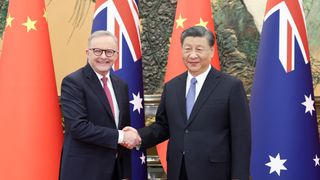Upon taking office as Australia's prime minister in May 2022, Anthony Albanese promised that his administration would work to "stabilise" relations with China, saying he would "cooperate with China where we can, disagree where we must and engage in our national interest."
Has Albanese been successful so far and if so, at what cost?
Albanese's trip two weeks ago to China, the first by an Australian prime minister since 2016, could be viewed as a success if "stabilisation" were defined narrowly as the resumption of high-level diplomatic dialogue and the removal of most of the coercive trade sanctions that China imposed on Australian exports over the past three and a half years.
This achievement appears to have been made possible in part by Albanese's abandonment of what he saw as predecessor Scott Morrison's needlessly provocative diplomatic tone and his blunt criticisms of China.
Yet the objective of stabilising relations with a country that openly seeks to revise the status quo and relies on escalation and tactical surprise is difficult to achieve.
It is important also to measure success according to Albanese's claim that the resumption of normal relations with China will not come at the expense of Australian national interests. In fact, Australia paid a significant price to clear a path for Albanese's meeting with President Xi Jinping.
First, in August, Canberra dropped its World Trade Organisation complaint against trade duties that China had imposed on Australian barley, despite reports that a dispute settlement panel had already found in its favour. Canberra has been content to allow China to resume barley imports without any acknowledgment of fault or offer of restitution to aggrieved Australian growers.
Looking at the bigger picture, Australia has shown that it is no longer willing to stand at the tip of the spear when it comes to defending the rules-based international order. By dropping the WTO case, the Albanese government has turned its back on formally calling out and punishing China for its illegitimate behaviour.
Rules and laws are nothing if illegal behaviour is not identified and punished. The larger issues at stake in Australia's case against China have not been lost on the EU or the 12 WTO members that joined the case as interested third parties.
One wonders what they have concluded about Australia's decision to prioritise immediate gains from resuming an export trade that was previously worth around 916 million Australian dollars (US$597 million) over the higher goal of defending global fair trade.
Canberra's decision has also undercut efforts to galvanise democratic countries to cooperate on "anti-coercion" mechanisms that could be deployed in the future, particularly in support of small and middle-income country victims.
Last month, Canberra repeated its act of self-interested capitulation, suspending a WTO case against China over its coercive tariffs on Australian wine while Beijing undertakes a five-month review. The EU and 17 WTO member states had joined Australia's complaint as interested third parties.
The decision by Albanese and Trade Minister Don Farrell to lead a delegation to the China International Import Expo in Shanghai makes clear that Australia is prepared to forgive and forget Beijing's campaign of trade coercion.
Indeed, that was the message received by some 200 Australian corporate leaders traveling with Albanese to Shanghai. Freed from the burdens of geopolitical reality, they toasted Albanese and their own expectations of new export sales to China.
There is an obvious folly in encouraging Australian businesses to let bygones be bygones and disregarding the lessons learned over the past two years about the vagaries of China's political economy. Albanese's actions also contradict Australia's declared commitment to join with the U.S. and other allies to "de-risk" to reduce dependence on China in critical areas and confront their vulnerability to potential economic coercion.
Australia's last two governments invested significant energy in persuading local companies to take the threat of Chinese economic coercion seriously. Albanese has set back the progress they made.
In return for Australian capitulation in the name of stabilisation, Beijing has given up little beyond removing trade restrictions it was wrong to impose in the first place.
Bear in mind the Chinese trade measures were imposed as punishment for Australia's moves to stand up to Beijing and to encourage others to do so. From Beijing's perspective, Australia's misdeeds included calling on China to abide by a 2016 arbitration ruling against its South China Sea claims, enacting legislation against foreign interference, banning Huawei Technologies from its 5G networks and tightening national security screening of inbound foreign investments.
To his credit, Albanese has not walked back any of these decisions. Yet the lure of securing a meeting with Xi has already dampened his administration's criticism of China. Officials now speak of "trade impediments" with China rather than economic coercion and praise themselves for raising difficult issues only behind closed doors.
Australia's voice was previously prominent on many issues that matter to the region and the rules-based order. But the current administration was conspicuously silent in October when Chinese Coast Guard vessels rammed ships attempting to resupply Philippine marines stationed on the Second Thomas Shoal in the South China Sea.
Albanese has spoken of Australia's openness to China's membership in the Comprehensive and Progressive Agreement for Trans-Pacific Partnership if it can meet the agreement's high standards for entry. At the same time, the prime minister has rebuffed Taiwan's application, with the incorrect statement that membership is not open to non-state entities. This position overlooks the likelihood that Taiwan better meets the pact's high standards than China does.
Last week, Australian navy divers on a UN sanctions enforcement mission within Japan's exclusive economic zone were injured by sonar pulses from a Chinese warship. On Monday, Albanese told a television interviewer that the Chinese action "was dangerous, it was unsafe and unprofessional" but did not say whether he had discussed it with Xi.
The wilful action by the Chinese navy is hardly evidence that Beijing is genuinely seeking a new era of friendly relations with Australia. The Albanese administration might congratulate itself for resuming high-level meetings with China, but of itself, this will not bring about a more stable and predictable relationship with Beijing nor increase Australia's standing with its allies and partners.






